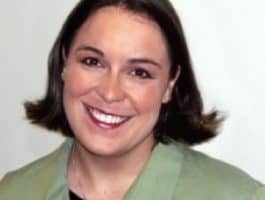
Approaching Marriage
Divorce has a dramatic impact on the lives of children. But how does it affect a person's approach to marriage as an adult? Jen Abbas and Elizabeth Marquardt, both adult children of divorce, talk about how how their parents' divorce affected their thoughts about marriage and family.
Show Notes
About the Host
About the Guest
-
Divorce has a dramatic impact on the lives of children. But how does it affect a person's approach to marriage as an adult? Jen Abbas and Elizabeth Marquardt, both adult children of divorce, talk about how how their parents' divorce affected their thoughts about marriage and family.
-
Dave and Ann Wilson
Dave and Ann Wilson are hosts of FamilyLife Today®, FamilyLife’s nationally-syndicated radio program. Dave and Ann have been married for more than 38 years and have spent the last 33 teaching and mentoring couples and parents across the country. They have been featured speakers at FamilyLife’s Weekend to Remember® marriage getaway since 1993 and have also hosted their own marriage conferences across the country. Cofounders of Kensington Church—a national, multicampus church that hosts more than 14,000 visitors every weekend—the Wilsons are the creative force behind DVD teaching series Rock Your Marriage and The Survival Guide To Parenting, as well as authors of the recently released book Vertical Marriage (Zondervan, 2019). Dave is a graduate of the International School of Theology, where he received a Master of Divinity degree. A Ball State University Hall of Fame quarterback, Dave served the Detroit Lions as chaplain for 33 years. Ann attended the University of Kentucky. She has been active alongside Dave in ministry as a speaker, writer, small-group leader, and mentor to countless wives of professional athletes. The Wilsons live in the Detroit area. They have three grown sons, CJ, Austin, and Cody, three daughters-in-law, and a growing number of grandchildren.
-

Elizabeth Marquardt
Elizabeth Marquardt is the director of the Center for Marriage and Families at the Institute for American Values, a nonpartisan think tank focused on children, families, and civil society. Her essays and op-ed pieces have appeared in the New York Times, Washington Post, Chicago Tribune, and elsewhere. She lives in Chicago with her husband and two children.
Jen Abbas
Jen Abbas is an adult child of divorce who has dedicated herself to discovering how children of divorce can change the patterns of their past.
Jen Abbas and Elizabeth Marquardt talk about how how their parents’ divorce affected their thoughts about marriage and family.
Approaching Marriage
Bob: Children who come from families where Mom and Dad have divorced can sometimes feel like damaged goods. Jen Abbas says others can make them feel that way.
Jen: Especially in Christian circles— there is this ideal of the happy Christian family—that we're close. When you come—even though I became a Christian when I was 19 and I obviously had no control over the fact that my parents divorced—I have had guys say: “You know, I want the kind of family that my family had. That's been my dream is to marry into somebody else who has this family. You know, I really like you, but all those Christian broadcast people say: ‘When you get married, you marry their family, too. You know, I can deal with you; but I can't deal with your family."
Bob: This is FamilyLife Today for Wednesday, October 9th. Our host is the president of FamilyLife®, Dennis Rainey, and I'm Bob Lepine. We’re going to talk today about children learning to forgive their parents for something those children will never be able to forget. Stay with us.
And welcome to FamilyLife Today. Thanks for joining us. You know, we’ve come to a place in our culture where we make movies and laugh about being adult children of divorce. Yet, I wonder if we really recognize the impact of a traumatic emotional event and how that can carry on for a period of time.
We’ve heard about Post Traumatic Stress Disorder—people who are still adjusting to a trauma they’ve been through, whether it’s as a result of war or some kind of a disaster. I’m just wondering if we’ve come to the point where we recognize that we have a nation of people who are dealing with Post Divorce Stress Syndrome—the children of divorce who grew up and who have a lot of hidden pain that, maybe, nobody has ever uncovered before.
Dennis: And, Bob, if we've learned nothing else this week, we have—and it's really the reason why we've given a full week of broadcast to the subject of children of divorce—it's that divorce has a dramatic impact on the lives of children. In fact, we're about to look into the research here as we go through the broadcast today; but I want to read you the findings—one of the ten findings from the first-ever national survey of grown children of divorce. The first finding was this—even amicable or good divorces have significant negative effects for children. We have learned that this week—that divorce is not good for children and for families.
Bob: The person behind that national study also wrote a book called Between Two Worlds. Her name is Elizabeth Marquardt. Elizabeth—welcome back to FamilyLife Today.
Elizabeth: Thank you.
Bob: Jen Abbas is also with us this week. Jen has written a book called Generation “E”“x”—Generation Ex—that comes, not from a national study, but from a lot of study—a lot of conversations with a lot of people—and your own experience as an adult child of divorce. Jen—welcome back.
Jen: Thanks for having me.
Dennis: You guys have been good sports. I now kind of feel like you're friends; alright?—especially you, Elizabeth. You've written this book, Between Two Worlds, which is a national study. I wanted to get your take on this because, throughout your book, you have the word "good" divorce in quotes, all throughout your book. Now, I looked up the word "good" in Webster's dictionary. "Good" means beneficial, healthy or sound, honorable, worth, virtuous, able to endure. Juxtapose that with the word "bad"—a "bad" divorce. The word "bad" means not as it should be—faulty.
Now, I want to ask you a question: “When you put that in quotes, what was behind that because you were very careful to not refer to divorce as being good; but you called some divorces "good" divorce?
Elizabeth: One of the things I do in this book is take on this idea of the "good" divorce. It was a term coined in a book, in the early '90s, by a family therapist named Constance Ahrons. It's widely used in the media. It's really evolved into this idea that it's not divorce itself that's bad for children but simply the way the parents divorce. And if we can just teach divorced parents how to divorce better, then we'll have fewer damaged and suffering children of divorce.
This is the idea I'm really trying to take on. One of the things we did in this study is we found that, for children, there is no such thing as a "good" divorce. It is certainly better for children if divorced parents stay involved in their child's life and don't fight with each other. That's certainly much better for the children. I think we can all figure that one out.
But their parents’ doing—even doing the right things, in the wake of the divorce—does not take away the pain of the divorce. In fact, in many ways, the children of so-called "good" divorces look worse than those who grew up in unhappy marriages so long as the parents' marriage was low-conflict, which is the majority of marriages ending in divorce.
One of my messages to all the married parents listening is that your imperfect, good-enough marriage is doing great things for your kids.
Dennis: It really is. And you shouldn't undersell it.
Elizabeth: Exactly.
Dennis: And, I'll tell you—I’m holding, in my hands, just a small fragment of the comments that come back from our Weekend to Remember® marriage conferences. We'll have anywhere from 400 to almost 4,000 people attend these events, across the country—150 of them this coming year.
Bob, you've read these. I'm always staggered by the number of comments of people who say: "You saved our marriage. We were at the verge of divorce. We already had the papers. We were ready to call it quits." I mean, here is one, right here: "We have committed to restore the oneness that years of hurt and rejection have destroyed by being served with divorce papers five"—count them —"five individual times." The following sentence is underlined: “We serve a powerful God who answers prayer—after 28 years, my husband wants to grow old with me.”
Elizabeth: That's beautiful.
Dennis: I'm going to tell you something—we get these comments—there's page after page in here: "I believe it has saved our marriage." "My wife and I were separating." "My husband filed for divorce six weeks ago after 27 years of marriage." Over, and over, and over again people are tossing the towel in because they think there's no hope. I think, importantly, as we pointed out all this week—there are consequences, regardless of the ages of your children—regardless of the ages of your children—to the next generation.
There is a generation today that wants us, as an older generation, to finish well and to finish and fulfill what we promised at the wedding altar.
Bob: I want to go back to when Jim Marquardt came to you and said, "Will you be my wife?"
Dennis: She's grinning!
Elizabeth: I am—“Sweetheart.” [Laughter]
Bob: Were you aware—were you in touch—this was ten years ago—longer than that; right?
Elizabeth: Right.
Bob: Were you aware of what was in your soul, as a child of divorce, and was there any hesitation? Did you feel like saying, "I need a…."—when you sell a car, you're supposed to give a truth in advertising—a truth in—“Here's the car report. You need to know what you're getting yourself into.” Did you feel like you needed to have that disclosure with him?
Elizabeth: Not about myself. I did feel like I had no idea how to evaluate how you make a marriage decision. And all I knew—it sounds silly—all I knew, at the time, is that, in 20 years, I'd be glad I'd married him. I couldn't figure out how to figure out, as a 24-year-old woman, if this was the right idea; but I knew he was a good person, who was my friend, and who I thought was cute. We had many similar interests; and I just knew, more than anything, that he had, I felt, enormous integrity. In ten years of marriage, I haven't seen anything different. I just feel very fortunate about that, while not taking anything for granted. [Laughter]
Dennis: You didn't have any discussions with him about this? I mean, I'm talking about—
Elizabeth: Well, we talked about my family a lot; but you know, I probably would have prickled at the idea that my family background meant that I might be damaged goods, when it came to marriage.
I remember when my mom and my soon-to-be-ex-stepdad sort of insinuated, on the phone with me, that this—and yet another divorce in my family might be damaging my own prospects for a future marriage. I was furious. I was just furious—this idea that something I had no control over could be held over my head and make others think differently of me.
Dennis: You did the research. That wasn't just your feeling. There's a whole generation that doesn't want to be labeled and have a stigma attached to them.
Elizabeth: Exactly. I have noticed that children of divorce, fortunately, are not particularly stigmatized anymore. I don't think so. As a child of divorce, I didn't feel much stigma. But I think there is a new stigma emerging among those who grew up with married parents who are reluctant to marry a child of divorce. In a sense, you can see why. I mean, we hear, every day, children of divorce have a much higher divorce rate themselves—they have much higher rates of all kinds of problems. You know, divorce can be transmitted—
Dennis: Hey, I read your book. I know the ending, yes. [Laughter]
Elizabeth: —inter-generationally. So—but I saw it here—you know, I've heard in interviews, or things I've read, or letters to advice columnists—young people, with married parents, saying something like: "You know, my parents have been married 40 years. I want a happy marriage like they have." "I'm dating this guy. He's from a divorced family. I don't really know if I want to marry him." Or another person saying, "You know, my boyfriend, we're really in love; but he grew up in a divorced family. It's almost like he grew up in a different culture, you know.” I'm just finding a lot of these anecdotes. I think it would be a real shame if people overlook the many wonderful qualities that we have to offer because of our family background.
Bob: Jen, you are in your 30s—never been married. You have experienced the stigma that Elizabeth is talking about; right?
Jen: Yes. I think—especially in Christian circles, there is this ideal of the happy Christian family—that we're close. When you come—even though I became a Christian when I was 19, and I obviously had no control over the fact that my parents divorced—I have had guys say: “You know, I want the kind of family that my family had. That's been my dream—is to marry into somebody else who has this family. You know, I really like you; but all those Christian broadcast people say, ‘When you get married, you marry their family, too.’ You know, I can deal with you, but I can't deal with your family."
Bob: Okay, I've got both of your books right here. Both of you talked about the profound, deep, emotional, spiritual impact of growing up in a divorced home.
Dennis: I want to answer this question before they do. Go ahead and ask it, though.
Bob: So, why wouldn't I, as a dad—if my daughter comes home and says: "I've met this wonderful guy. You know, his parents’ divorced." I'm thinking: [Sounding like a warning signal] “Dootoo-dootoo-dootoo,”—you know—“Warning! Warning! I read Marquardt's book; I read Abbas's book. He's going to come with all of this stuff.” I mean, "Honey, find somebody that doesn't have the stuff!" So you want to answer that first?
Dennis: I do; I do. I want to answer it as a father-in-law.
Bob: Okay.
Dennis: Alright? Who doesn't have stuff, first of all?
Jen: Amen! [Laughter]
Dennis: Okay; okay. Who doesn't have stuff? Secondly, this is a broken culture, as every other culture has been. This culture just happens to bear the plague of divorce upon it. Is it huge? Yes. What is Christianity all about? At its core, if you could slice it open and dissect it, it's about redemption—it's about broken people in the process of being restored and being loved out of their brokenness. Trust me—this is more than just theory because some of our children have married others from families that are less than perfect—they're broken.
Do you know what they found out? They found out our family is less than perfect. [Laughter] But do you know what they're doing? They, along with their spouses, are exhibiting love. They are linking arms in the greatest promise two people ever make with one another, and they're teaching one another how to love in an imperfect world.
And would it be ideal, would it be perfect, if all of us had these perfect little families? Yes! I wish Adam and Eve hadn't blown it; you know? And I wish I hadn't blown it and Barbara, as well. But the reality is this is a broken culture, and you're not going to have this perfect world.
Bob: Elizabeth, if a 35-year-old, never-been-married friend of yours comes—who grew up in an intact, loving, nurturing, supporting family—and says: "I've met this guy. He's a wonderful guy. His parents were divorced, and his mom and his stepfather were also divorced. I'm thinking about marrying him. What kind of counsel would you give me?”
Elizabeth: You know, we're all—none of us are defined by one event in our lives. We're complex people, but there certainly are some patterns that seem to turn up among a lot of children of divorce—often, a sense of guardedness, difficulty trusting, difficulty with intimacy, not knowing how to reveal, how to set healthy boundaries, how to reveal, how to protect yourself in healthy ways.
But even more so, it can help all of us know the children of divorce better. Part of it is understanding how this fairly complex family they come from shapes who they are now.
Bob: So you're saying: "Go in with your eyes wide-open. There's going to be work to be done as there is in any relationship. Be ready to do the work and press ahead"?
Elizabeth: I'm fairly convinced that we're all sinners. We've all got problems. You know, there are some problems that some of us deal with, but there are others—
Jen: My brother is married, and my sister-in-law comes from an intact family. She has been such a healing agent for my family. She and my brother had a little boy about two years ago. Before my nephew was born, my mom and dad had not been in the same room for about 26 years.
And my sister-in-law was at a place that she could be the one that had to be strong. She said: "You know what? I would like both of you to be a part of this birth. Nothing would make Chris and I happier. But you need to realize that you guys make your decisions. You need to deal with the consequences of those, but this is our family. So, if you guys want to be a part of your grandchild being born, you need to come; and you need to respect the fact that this is our family."
Because she was coming from that intact family, she knew that was perfectly within her rights. For my brother, you know, it would have been a lot harder for him to have that conversation and kind of lay down the law that way because he was feeling these loyalty issues and all of this other stuff. But she was able to say it. To my parents' credit, they came. They were both there. I have this picture of my mom, my dad, my brother, and my sister-in-law, and my nephew in one photo. When I saw it, I wept because I never thought I'd see the day. You know, I shudder to think what would have happened if she would have not been open to that.
Bob: When you called her a "healing agent"—Dennis, you kind of gave this little chuckle—this little heh-heh-heh.
Dennis: You know, as I'm listening to both of them really talk about this, there are three things I want to say just to this mythical couple who are about to get married. First of all, don't minimize the divorce. You can't deny the reality of the damage, or of the hurt, or of what that did. That, to me, is more dangerous—entering into a marriage than, well, a lot of things you could do.
Secondly, and I think Elizabeth mentioned this, but I just want to underline it— realize that: It is work. But you know what? Marriage is work, regardless. It's just going to mean you're going to have a little bit more extra work. There may be some fossils that have to be dug out and unearthed. Sometimes, that requires careful—you know—careful digging, as you go forward.
But a third is never forget that the marriage covenant is a pledge, by two imperfect people, to love one another for a lifetime. Even two intact families coming together—what is it? It's still a marriage covenant by two selfish, sinful people, with backgrounds, coming into relationship where they are called "'til death do us part,”—“for better; for worse."
Elizabeth: That's pretty tough stuff.
Bob: That is tough.
Dennis: It is hard stuff. But then there's one comment I want to make, right now, to the in-laws because, as an in-law, you can wish for your children this dream that we talked about, here—of two intact families coming together in the perfect, idyllic wedding, and where it is happily ever after. That may occur in the storybooks. I don't think there's anything wrong with two intact families—please, God forbid that we'd be found guilty of anybody thinking we're saying that.
I think that is the ideal; but if your child does marry a person who comes from a divorce background, your command, as a parent, is to love. And, you know, we now have five children who have been grafted into our family. You know, I'm asked how many children I have—well, six—but I actually have eleven because we have five who have come to us by way of marriage.
Well, you know what? I've found that there is a great privilege in that assignment of becoming a new father to a couple of young men who I gave my daughters to. I mean, talk about getting intimate; you know? But I love those guys, and I'm in the process of loving them; but that's our assignment, as parents. If you've got daughters, who have married your sons—same deal. You can find fault with them—you can look backwards at the mistakes they made, or their family’s made, and you can find them guilty.
But you know what? That's not what the Bible is about. The Bible is about the command to love. Read First Corinthians 13. Read it with your son-in-law in mind / your daughter-in-law in mind: "Love believes all things, bears all things, hopes all things. Love never fails." What a privilege. So, you know, I think what we've talked about here, all this week, is real stuff. I mean, it's real hurt, real pain, real people; but that's the earth to which the Savior came. I just want to say: “Thanks, again, to Elizabeth—you and Jen—you—for being real and for your writing these books. I think these books are going to help a lot of people. Thanks for being on the broadcast.
Elizabeth: Thank you so much.
Jen: Thank you.
Bob: Let me encourage our listeners to go to our website, FamilyLifeToday.com, to get a copy of Elizabeth's book, Between Two Worlds. I think a lot of moms and dads just try to convince themselves that their “kids are going to be okay if we split up.” The reality is that the kids may be okay, but they’re going to have some issues to deal with as a result of the divorce. That’s just what the social science research is showing us. That’s what’s proved out in Elizabeth's book, Between Two Worlds.
You can go to FamilyLifeToday.com to request a copy. Again, the website: FamilyLifeToday.com; or call 1-800-FL-TODAY for more information: 1-800-358-6329. That’s 1-800-“F” as in family, “L” as in life, and then, the word, “TODAY”.
I had a chance to have breakfast yesterday morning with a friend of mine who is a guy who really cares deeply, passionately about marriages and families in our culture today. He’s a kindred spirit. We were talking about some of the new initiatives that FamilyLife is working on—some of the things we’re trying to do. He said: “You know, when you look on the landscape and ask the question, ‘Who is really applying a biblical solution to the issues that are facing marriages, and families, and the culture today?’” He said, “You guys, at FamilyLife, are the first name that comes to mind for me.”
I was encouraged to hear that. Obviously, because our mission at FamilyLife is to see every home become a godly home. We want to see husbands and wives—moms and dads—reorient their lives according to all that is laid out for us in the Scriptures. That’s what we seek to do through this radio program—through all of the resources we produce. We are committed to that mission.
We appreciate those of you who share that conviction—that this is an important thing to be working on in this day and in this time. Those of you who help support us financially—we couldn’t do what we do without you. We appreciate your financial support. This week, if you’re able to make a donation in support of FamilyLife Today, we’d like to say, “Thank you,” by sending you a book by Jennie Allen called Anything. It’s about the prayer that Jennie and her husband prayed that she says had a profound impact on their lives and on their choices today.
You can request the book when you make an online donation at FamilyLifeToday.com. Just click the button that says, “I CARE”, or call 1-800-FL-TODAY. You can make your donation over the phone. Ask for the book, Anything, when you do that. You can also request a copy of the book in writing. Send your donation to: FamilyLife Today, PO Box 7111; Little Rock, AR 72223.
And, I hope you can join us back tomorrow. We're going to talk about what couples can do, before they ever get married, to try to make sure their marriage goes all the way to the finish line. We’ll talk with Dennis and Barbara Rainey about preparing for marriage tomorrow. I hope you can tune in for that.
I want to thank our engineer today, Keith Lynch, and our entire broadcast production team. On behalf of our host, Dennis Rainey, I'm Bob Lepine. We'll see you back next time for another edition of FamilyLife Today.
FamilyLife Today is a production of FamilyLife of Little Rock, Arkansas.
Help for today. Hope for tomorrow.
We are so happy to provide these transcripts to you. However, there is a cost to produce them for our website. If you’ve benefited from the broadcast transcripts, would you consider donating today to help defray the costs?
Copyright © 2013 FamilyLife. All rights reserved.
1




